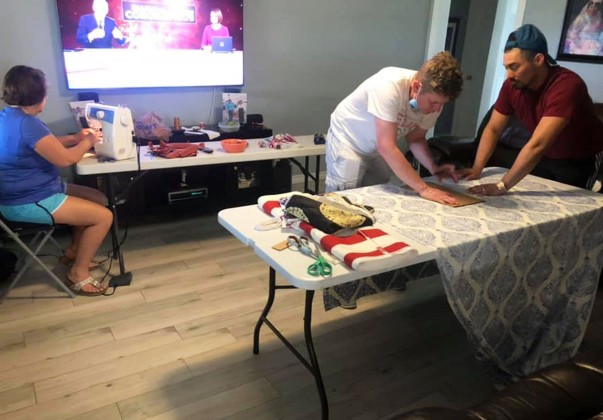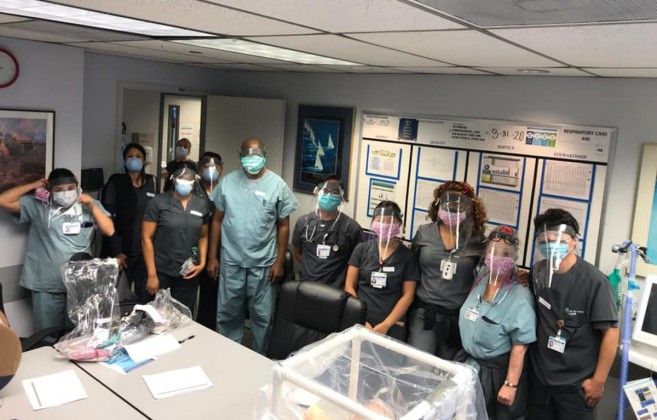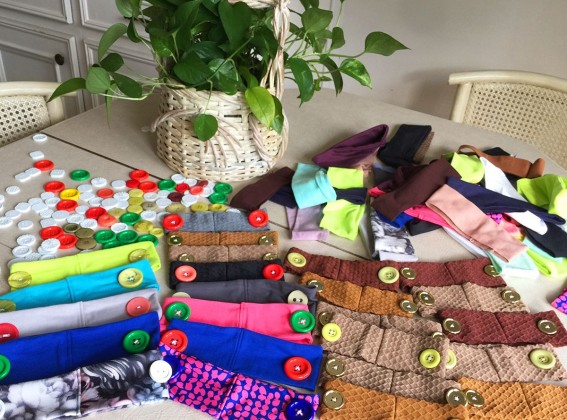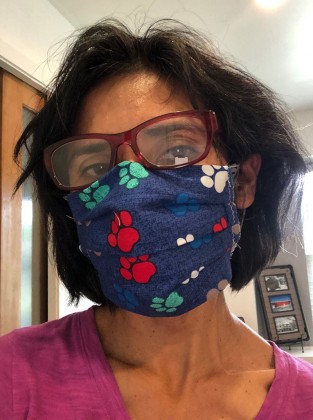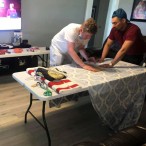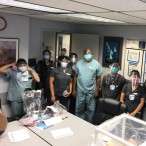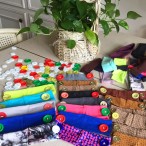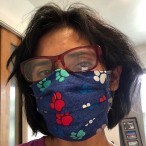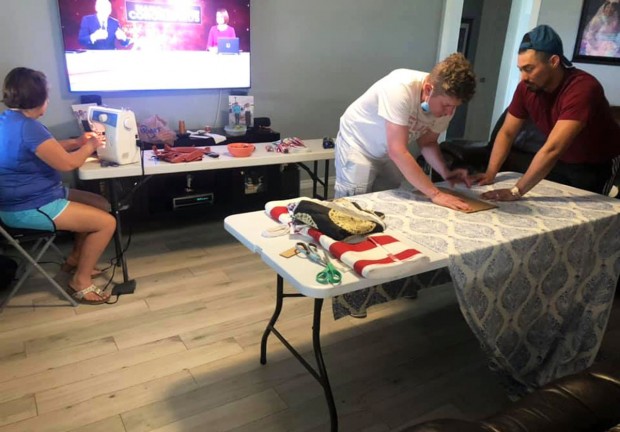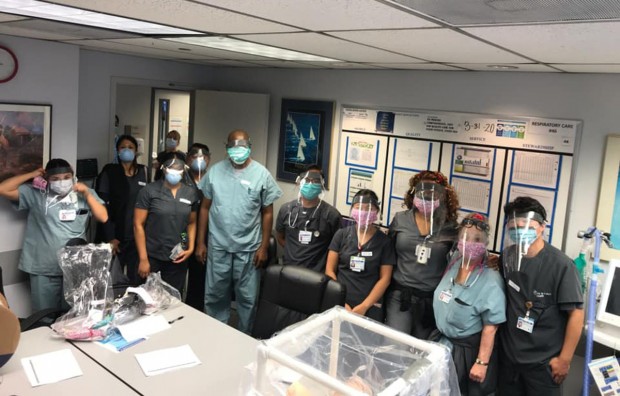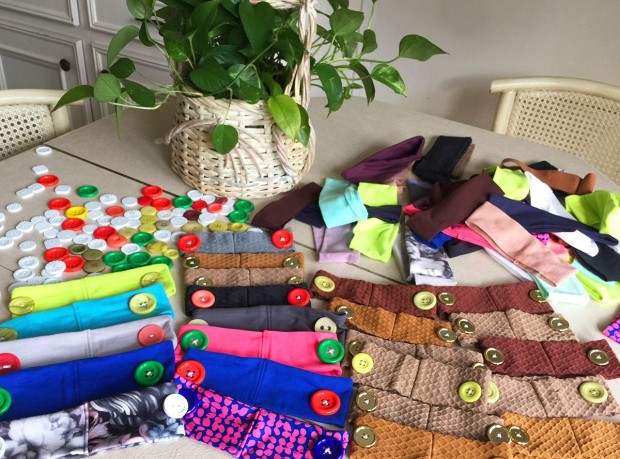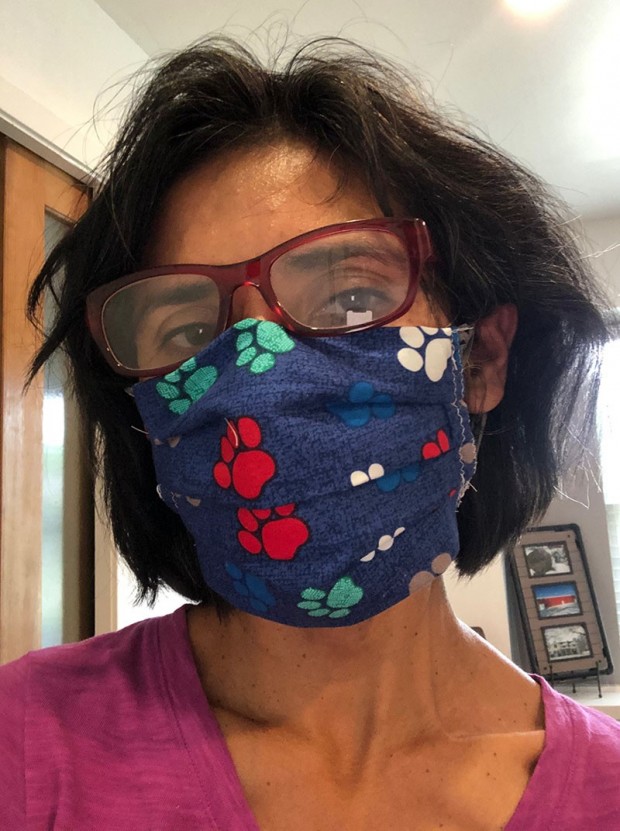Helping Hands: Residents Rally to Make Masks

An adept baker widely known as the “Tres Leches Lady,” Aurora Brunel was no expert at sewing. But, three weeks after creating Masks of Hope – a Facebook group dedicated to coordinating face mask-making during the coronavirus pandemic – Aurora’s days are filled with nothing but sewing.
“My kitchen and my entire house are taken over by supplies,” Aurora says while taking a break from sewing on Sunday afternoon. “My home is like a trading shop. Outside my door, people are picking up and dropping off fabric and supplies.”
Aurora’s mask-making efforts started in early March. She had been in close contact with her son Roberto, a seminarian studying in Rome, and was hearing about the dire coronavirus situation in Italy, where a lack of sufficient personal protective equipment was creating concerns for medical professionals on the frontlines.
Aurora started thinking about what small part she could play to help her community stave off similar supply shortages. She started watching YouTube videos of people making their own masks, like this one, and decided to try to do the same.
To enlist help from her friends, she created the Facebook group she called “Masks for Hope” on March 22, simply inviting her 100 or so Facebook friends to join. Immediately, there was an outpouring of support. Friends with sewing machines volunteered to help make masks; others purchased fabric and dropped it off at Aurora’s home; one woman she had never met offered a large industrial machine to cut fabrics.
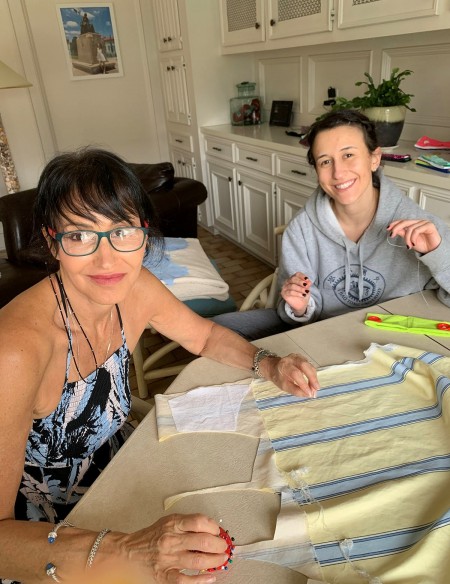
Marissa Rombado and her daughter Bianca Rombado have been volunteering their time to help make protective gear for Masks of Hope.
“It’s been so much fun watching [Aurora] do this,” says Aurora’s friend Marissa Rombado. Marissa was watching the group grow in size each day – today there are nearly 1,000 members – and she too was inspired to help. “I kept seeing posts and pictures of first responders and people in medical offices wearing their masks. Finally, I reached out and said, I want to do something, but I don’t have a sewing machine,” Marissa recalled.
Aurora says there are many ways that people without sewing machines can help. For instance, Marissa started by helping sew buttons onto headbands. Many first responders have found it uncomfortable to wrap the elastic from the face masks around one’s ears; the headbands with buttons provide a comfortable alternative.
Volunteers can also offer to wash, dry and iron the fabric and then cut it to prepare it for sewing the masks, which include a slit that first responders can use to add a filter. “I spend a long time every day cutting the fabric,” says Marissa. “It’s very therapeutic. You just feel a little better that you’re helping.”
Each morning, Marissa makes a run to Aurora’s home in Tanglewood to drop off what she’s cut and to pick up more fabric, which, according to Aurora, “just seems to appear on the doorstep,” dropped off by different volunteers in the Facebook group.
“These are the silent heroes,” Aurora says of the volunteers. “I want to do a Zoom happy hour or something to get to know everyone. It’s like we’re working with ghosts but really they are angels.”
Siblings Hailey and Jaden Sutton, 8 and 6, respectively, were recruited by Lesley Robbins to help create masks for first responders.
Masks for Hope is prioritizing donations to first responders, but Aurora says she doesn’t turn away any requests. The CDC recently recommended that everyone wear cloth face coverings in public settings in order to curb the spread of the virus, so Aurora does fill other requests, but those for frontline workers are always bumped to the front of the line.
In addition to the face masks and headbands, the group has also been making caps and ear guards. In total, the group has made and donated more than 4,000 protective materials to groups ranging from fire departments to pediatric clinics to state troopers who work in the airport.
Friends of Aurora’s in Mexico and Canada have also created their own Masks of Hope groups, replicating patterns that Aurora’s group is using.
Separately, other Buzz residents have been creating masks for friends, family and first responders, too. Olga Bowyer says she waited in line at Joann Fabric for nearly three hours, waiting to get material to make masks. She has made dozens of masks for family and friends and says she will continue to do so as long as there is a need.
Another Facebook group, Create Face Mask Covers Houston, has grown to more than 900 members. That group, started by Natalie Jones, is focused on making face mask covers that extend the life of surgical masks that medical professionals wear.
Meanwhile, Lesley Robbins, a Bellaire resident, recently enlisted neighbors to help create a total of 500 face shields, which were donated to non-profit Project C.U.R.E., the largest supplier of medical donations, as well as to the VA Medical Center and to St. Luke’s Hospital.
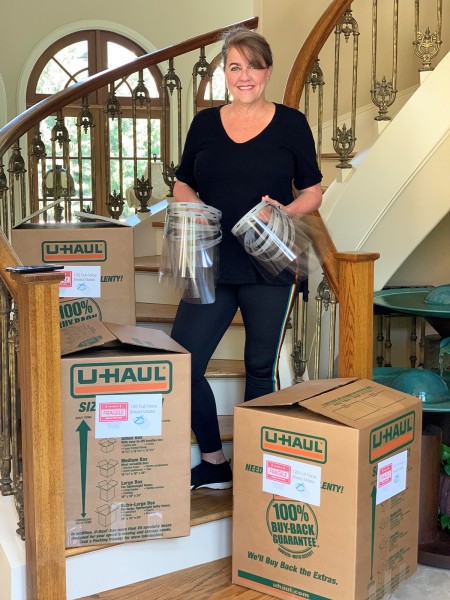
Lesley Robbins, pictured, recruited her Bellaire neighbors to help her make 500 face shields that were donated to first responders.
Lesley got the idea after hearing about this family who was making 400 protective face shields for first responders. She ordered the materials and then went by each of her neighbors’ homes, dropping off a note in their mailbox, explaining what she was doing and requesting that they contact her if they were interested in helping make face shields.
Immediately, calls and texts flooded her phone, with neighbors eager to help. Lesley put together kits that included all of the materials, and she dropped them off at neighbors’ houses. For an extra touch of kindness and support to first responders, she asked neighbors to write an inspirational quote on the headband of the mask.
Lesley says she got goosebumps as she read the masks with kind notes such as: “You are very valuable and so appreciated for your care! May God and this shield protect you.”
“What an amazing neighborhood and community we have,” Lesley said. “Everyone is doing a little bit of something to help.”
Editor’s note: If you’d like to help with the mask-making efforts, you can join either of the open Facebook groups (Masks of Hope and/or Create Face Mask Covers Houston). Here are some helpful recommendations to keep in mind when wearing a face mask.
Want more buzz like this? Sign up for our Morning Buzz emails.
To leave a comment, please log in or create an account with The Buzz Magazines, Disqus, Facebook, or Twitter. Or you may post as a guest.


